A new temperature reconstruction indicates today’s sea surface temperatures are colder than all but a few millennia out of the last 156,000 years.
A Southern Ocean site analyzed in a new study (Ghadi et al., 2020) has averaged 1-2°C during glacials and 4°C during interglacials. Today, with a 410 ppm CO2 concentration, this location has again plummeted to glacial/ice age levels (2°C).
The site was 2°C warmer than now when CO2 concentrations were 180 ppm about 20,000 years ago, or during the peak of the last ice age. During the Early Holocene (10,000 to 8,000 years ago), summer sea surface temperatures were also 2°C warmer than today.
There is no indication that CO2 concentration changes are in any way correlated with temperature changes throughout this entire 156,000-year epoch.






Yet another good find Kenneth!
Yet again the abilities of atmospheric CO2 to heat this planet’s air and disturb the weather or climate is found wanting. CO2 just greens the planet and that will alter climate in the affected regions.
Historical evidence trumps imaginary theory.
[…] Read more at No Tricks Zone […]
But what about all that missing heat that is lurking at the bottom of the sea, along with Godzilla?
If I was doing that reconstruction I would be going back over my work in forensic detail.
[…] New Study: A Southern Ocean Site Has Just Cooled To Ice Age-Era Temperatures – 2°C Colder Than 20… “There is no indication that CO2 concentration changes are in any way correlated with […]
Interesting, but should soon be reflected in the open atmosphere in order to match earlier warmings and coolings as reported by Easerbrook’s 800,000 year study “The Solar Magnetic Cause of Climate Changes and Origin of the Ice Ages”. (available via Amazon).
Sun activity apparently dropped to record lows in December 2019. That should bring on more cloud cover which means less sun radiation reaches the earth’s surface which leads to COOLING.
Do they know how recently the temperature at the Southern Ocean site were higher than 2 deg C? Thanks.
[…] Read more at No Tricks Zone […]